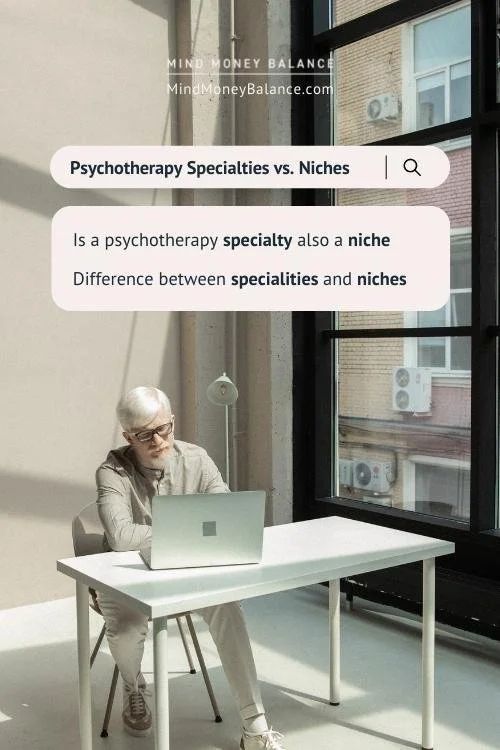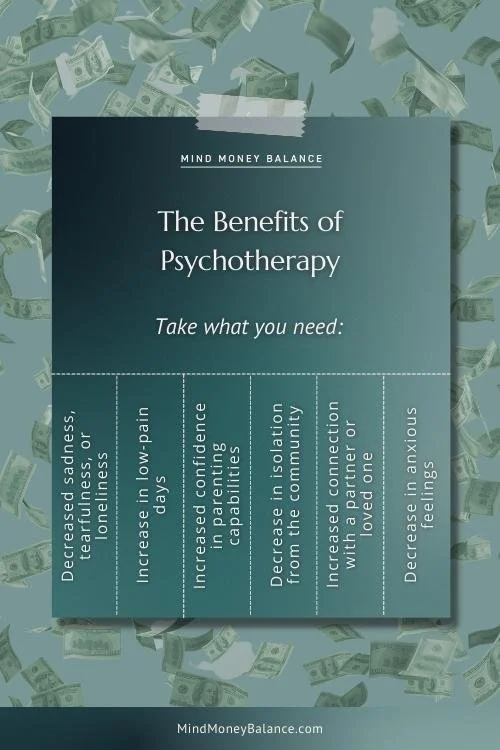How to Get More Therapy Clients With a Niche
Updated March 2024
How to Get More Therapy Clients with a Niche
After "how much should I charge" and "how many clients should I see," the question "How to get more therapy clients?" is one of the most common I get. As a financial therapist and coach for private practice therapists, this question doesn’t surprise me but what does is what therapists think a niche is. Shockingly, a laundry list of all the people you could see in your private practice isn't the way to do it.
Instead, getting super clear on the types of clients you love working with is the better approach. This is called "niching down," or "choosing a niche." A therapy niche is a focused, targeted group or type of person that you know how to help. When you niche down to serve clients you love working with, you’ll call in aligned clients, and become known as the go-to expert.
“When you niche down to serve clients you love working with, you’ll call in aligned clients, and become known as the go-to expert”
Niching is an integral part of organically marketing your therapy practice and getting more clients. When you niche down to serve clients you love working with, you'll call in aligned clients, become known as the go-to expert for your niche, and likely, have better therapeutic outcomes. While some therapy seekers will know the type of therapy intervention they are after, most just know what's bugging them and that they want help. Meeting their client where they are at by specifically talking to them using regular language is where a therapy niche will help you shine.
Psychotherapy Specialties vs. Niches
A psychotherapy specialty is not the same thing as a psychotherapy niche. A common point of confusion when I'm working with therapists is they think their psychotherapy specialty is their niche. As in, "I'm a psychodynamic therapist; that's my niche!" When I ask them to go deeper, they usually throw even more psychobabble jargon at me, as a way to "prove" that they have found a niche. A psychotherapy specialty, such as a therapeutic approach or intervention, can inform a therapist's niche, but it is not their niche.
“A psychotherapy specialty can inform a therapist’s niche, but it is not their niche. ”
A psychotherapy specialty can inform a therapist's niche, but it is not their niche. Having a laundry list of credentials and certifications on your website bio can seem like the right way to go about listing your expertise. More often than not, it just confuses the therapy seeker.
Think of your psychotherapy specialty as how you'd introduce yourself to another clinician and a niche as the way you'd present your work to a non-therapist. For example, a therapist may be trained in and use cognitive behavioral therapy and somatic processing (a psychotherapy specialty). Still, they specifically serve overachieving men who have difficulties creating and maintaining work-life boundaries (a niche).
Counseling Areas of Interest
Before we get into the list of therapy niches, take a second and think about your counseling areas of interest. This can be a total braindump. Think about the ages of clients you like to see, the presenting problems, their personality, the diagnosis, what they do for work/study in school, the modality you use, basically everything that lights you up about doing your work. Now do the same with the types of clients you don't like to see (I know, this is the one that makes most therapists cringe as we are trained to be generalists). Think the clients that you really have to ground yourself before you see, the ones you secretly hope no-show, or the ones you imagine you'll have to refer out. The data about the clients you don't like to see gives you just as much information, if not more, about the niche you should seek out. Start to organize both of these lists. See if there are themes, commonalities, or overlaps in the types of clients you are interested in and want to make your target niche.
List of Therapy Niches
Part one of creating a niche is communicating directly to WHO you help. As a visual and experiential learner, I do best when I see things listed out or in example format. Here is a sampling of an inconclusive list of therapy niches to help get your wheels turning as you carve out your mental health and wellness niche.
List of Therapy Niches--Life Stage or Life Event
New to the workforce, anxious young professionals
Empty-nesters struggling to reconnect and rekindle their connection
Couples expanding into a non-monogamous relationship
Military families moving back to the U.S. after several years overseas
Adult children coping with an estate left by parents without a will or trust
List of Therapy Niches--By Diagnosis or Condition
Breast cancer survivors
Former tobacco users
People with diabetes
Highly sensitive parents
Neurodiverse teenagers
List of Therapy Niches--The Misfits
Social justice advocates
Therapy for video gamers or self-identified nerds
Almost-pro athletes who've left the sport
Childfree-by-choice couples
List of Therapy Niches--The Marginalized
Sex workers
Indigenous college students
Black men in tech
Muslim feminists who wear hijabs
Filipinx couple moving from Los Angeles to St. Louis
List of Therapy Niches--Regional Specialties
Therapy for third-culture kids in Chicago
Asian women working in investment banking
Jewish families moving from New York to Ohio
Large animal veterinarians in Nebraska
The Benefits of Psychotherapy
Part two of creating a counseling niche is what outcomes clients can expect from working with you. In other words, what are the benefits of psychotherapy? Be crystal clear about the outcomes or benefits of counseling for college students, counseling for depression, or counseling for couples.
Depending on who you help, the potential benefits of psychotherapy are:
Increased capacity to manage irritability and anger
Decreased sadness, tearfulness, or loneliness
Increase in low-pain days
Decrease in anxious feelings like being on edge or feeling overwhelmed
Increased confidence in parenting capabilities
Decrease in isolation from the community
Increased connection with a partner or loved one
To really make these niches stand out, I recommend blending two or three together to get a clear picture of who you help. For example, "I help military spouses reconnect after deployment so they can fall back in love." Another example is, "I help social justice advocates who live in the Midwest practice radical self-care so they can show up fully restored to advocate for change." These combine the WHO you help with WHAT outcomes a potential client can expect from working with you.
Organic Marketing Through a Niche
For most private practice owners, having a niche helps you stand out, solidifies you as a go-to expert, and reduces your risk of burnout by seeing non-ideal clients. If niching is stressing you out and you are struggling with the internal dialogue of "but I have to help everyone!"
When you market organically, ideally through word of mouth, referrals, and a beautiful and hardworking website (like the one you’re scrolling on via Hold Space Creative) I’ve got a self-paced mini course all about sustainable marketing that can help you with your niching and marketing efforts. Learn more about that course, and my other private practice courses, here:




